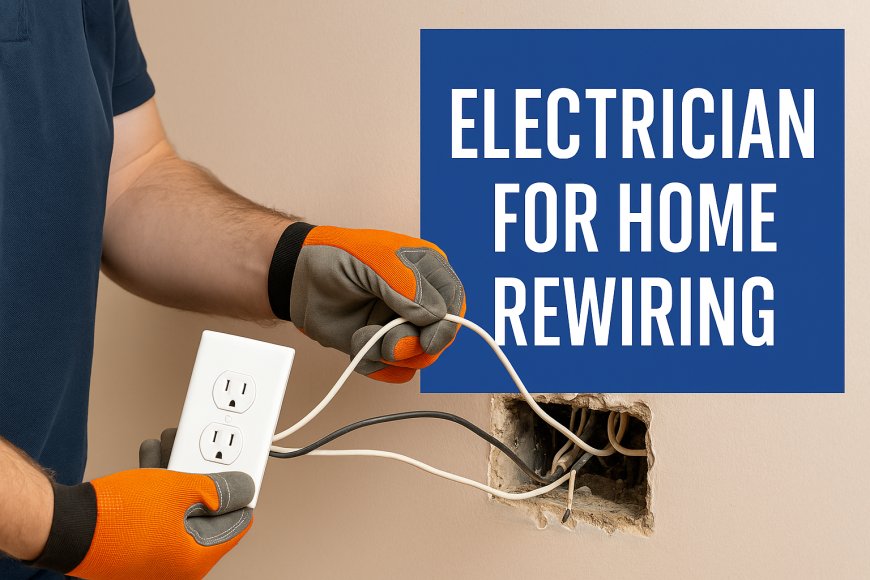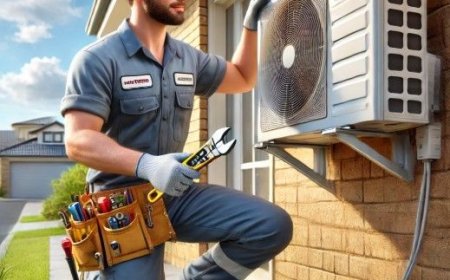Why Hiring a Professional Electrician for Home Rewiring Is Essential
Home rewiring is a crucial investment in the safety, functionality, and future value of your property. Whether you’re upgrading an old electrical system or renovating your home, rewiring is not a DIY project—it demands expert knowledge, experience, and licensing. This is why hiring a licensed Electrician For Home Rewiring is not just advisable, but absolutely necessary.

Home rewiring is a crucial investment in the safety, functionality, and future value of your property. Whether you’re upgrading an old electrical system or renovating your home, rewiring is not a DIY project—it demands expert knowledge, experience, and licensing. This is why hiring a licensed Electrician For Home Rewiring is not just advisable, but absolutely necessary.
Outdated or faulty wiring can be a ticking time bomb, posing serious fire and shock hazards. If your home is over 30 years old or showing signs of electrical trouble—like flickering lights, frequent circuit trips, or burning smells—it’s time to take action. In this article, we’ll explore the reasons to hire a professional, what the rewiring process involves, and how it can enhance your home’s safety and efficiency.
Why Home Rewiring Is Important
Over time, electrical systems deteriorate, especially in older homes that weren't built to handle modern electrical loads. Aged wiring may not meet current safety codes and could be:
-
Covered in deteriorating rubber or cloth insulation
-
Inadequately grounded
-
Running through outdated fuse boxes
-
Unable to support new appliances, smart devices, or HVAC systems
Ignoring these issues can lead to severe consequences, including electrical fires. That’s why calling a qualified Electrician For Home Rewiring is the best way to ensure your home remains safe and up to date with electrical standards.
Signs You Need Home Rewiring
Not sure if your home needs rewiring? Here are the common red flags:
-
Circuit breakers that trip frequently
-
Dimming or flickering lights
-
Discolored or warm power outlets
-
Buzzing noises from walls or outlets
-
Two-prong (non-grounded) sockets
-
Burning smells without a visible source
-
No safety switches (RCDs) in your switchboard
If you notice any of these signs, it’s time to consult an experienced Electrician For Home Rewiring to inspect your system and recommend the right course of action.
What Does the Home Rewiring Process Involve?
Home rewiring can be a large-scale job, depending on the size and layout of the home. Here’s a breakdown of what to expect when you hire a professional:
1. Initial Inspection & Planning
The electrician assesses your current wiring, tests circuits, and identifies areas that require upgrades. This stage also involves planning the placement of new power points, switches, and light fittings.
2. Disconnection of Old Wiring
To begin the rewiring safely, power is shut off and the old wiring is removed or deactivated.
3. Installation of New Wiring
New cables are routed through walls, ceilings, and floors. This may involve cutting into plaster or drywall, which is later patched and repaired.
4. Upgraded Switchboard and Safety Devices
Modern switchboards come equipped with circuit breakers and residual current devices (RCDs) for better protection. This upgrade is essential for safety and compliance with modern regulations.
5. Testing and Certification
Once installation is complete, the electrician tests all circuits, sockets, and switches to ensure everything is working correctly and safely. You’ll also receive a Certificate of Electrical Safety.
Benefits of Hiring a Licensed Electrician for Home Rewiring
There’s a big difference between a handyman and a certified electrical contractor. Choosing a qualified Electrician For Home Rewiring ensures:
-
Compliance with Australian Standards
-
Guaranteed workmanship and safety
-
Insurance coverage for completed work
-
Accurate problem diagnosis and efficient solutions
-
Minimal damage to your property during installation
Licensed electricians also stay updated on local building codes and regulations, ensuring your home is fully compliant and ready for future resale.
How Much Does Home Rewiring Cost?
Costs can vary depending on the size of the house, access to walls, number of outlets, and whether a switchboard upgrade is needed. As a rough estimate, rewiring a three-bedroom house in Melbourne can cost between $4,000 and $10,000.
While the cost might seem high, it’s a worthwhile investment that protects your family, adds value to your home, and prevents costly electrical fires.
To get a detailed quote, it’s always best to request a consultation with a reputable Electrician For Home Rewiring in your area.
Home Rewiring for Renovations and Extensions
Planning a home renovation or extension? That’s the perfect time to upgrade your electrical system. Adding a new kitchen, second floor, or entertainment system places additional load on your wiring. A rewiring project ensures that your entire home can safely handle the new demands.
Plus, it gives you the opportunity to install modern amenities like:
-
USB power points
-
Smart lighting systems
-
Energy-efficient circuit setups
-
Home automation devices
-
Dedicated circuits for high-power appliances
Final Thoughts
Your home’s wiring is one of its most vital yet invisible systems. Don’t wait for an emergency to think about rewiring act early to avoid danger and improve electrical performance. A licensed Electrician For Home Rewiring ensures the job is done safely, legally, and efficiently.
Whether you’re upgrading for safety, functionality, or future resale value, rewiring is a smart move that pays off in peace of mind. If you live in an older home or are planning a major renovation, now is the perfect time to schedule a professional electrical inspection.










































































